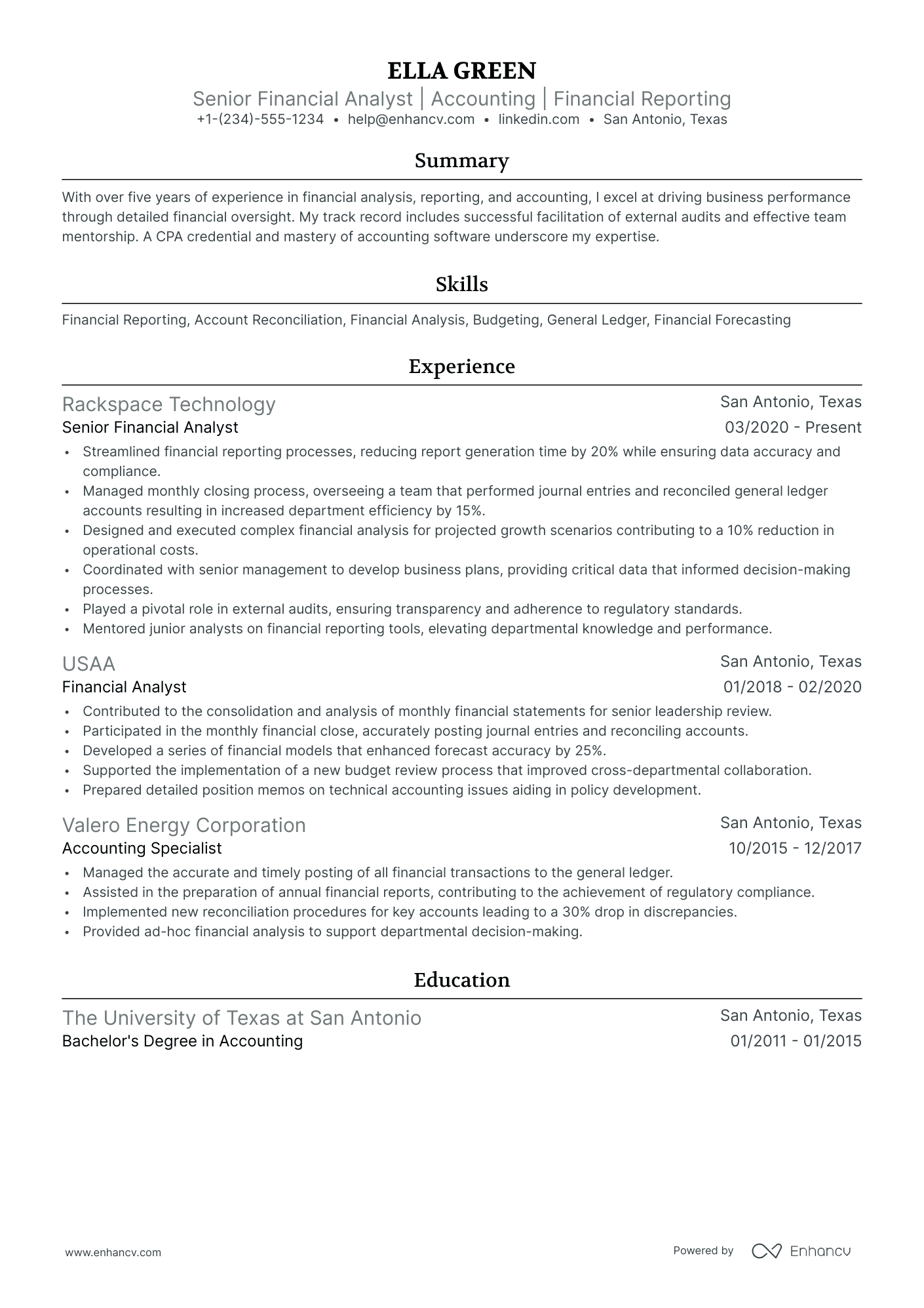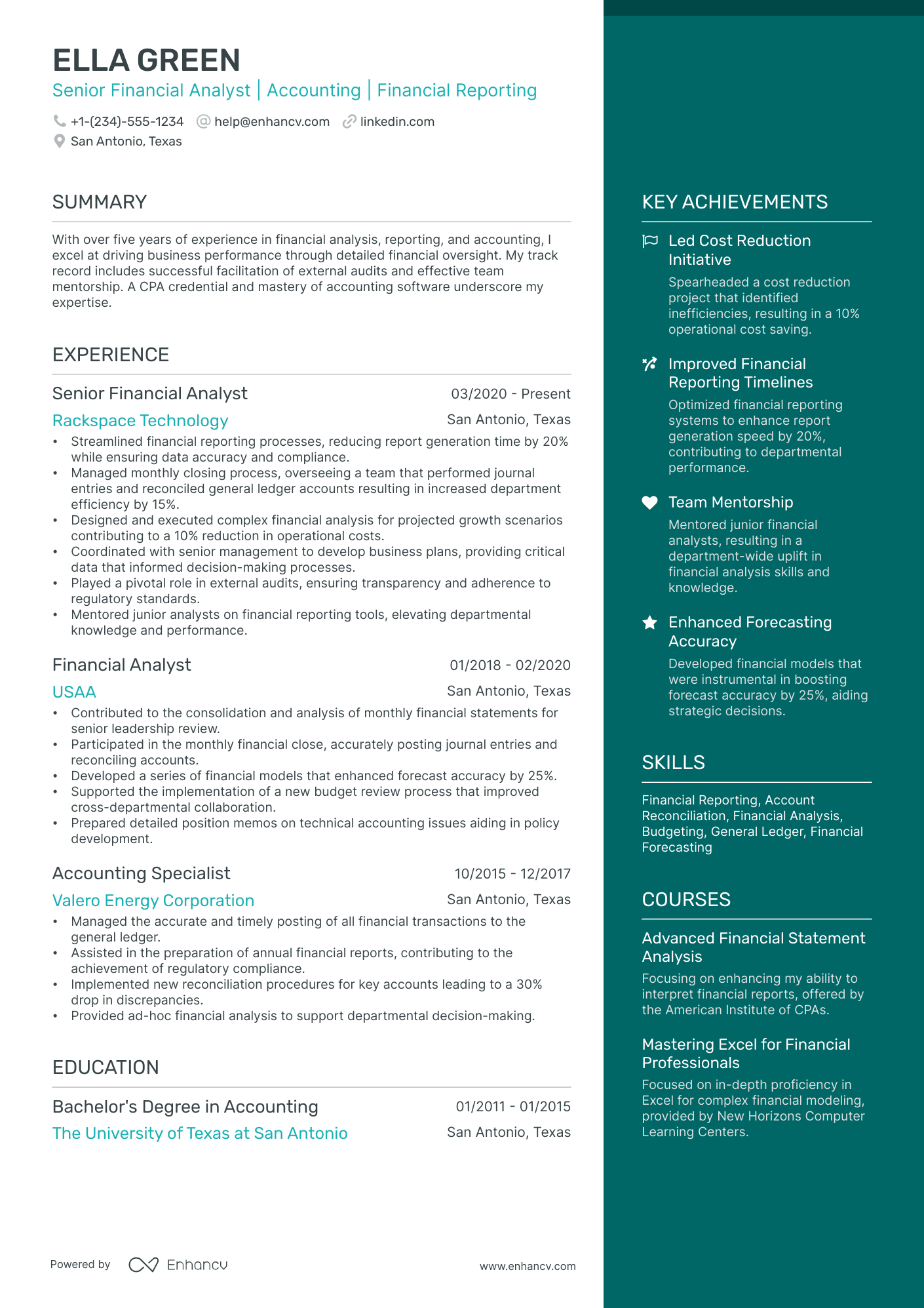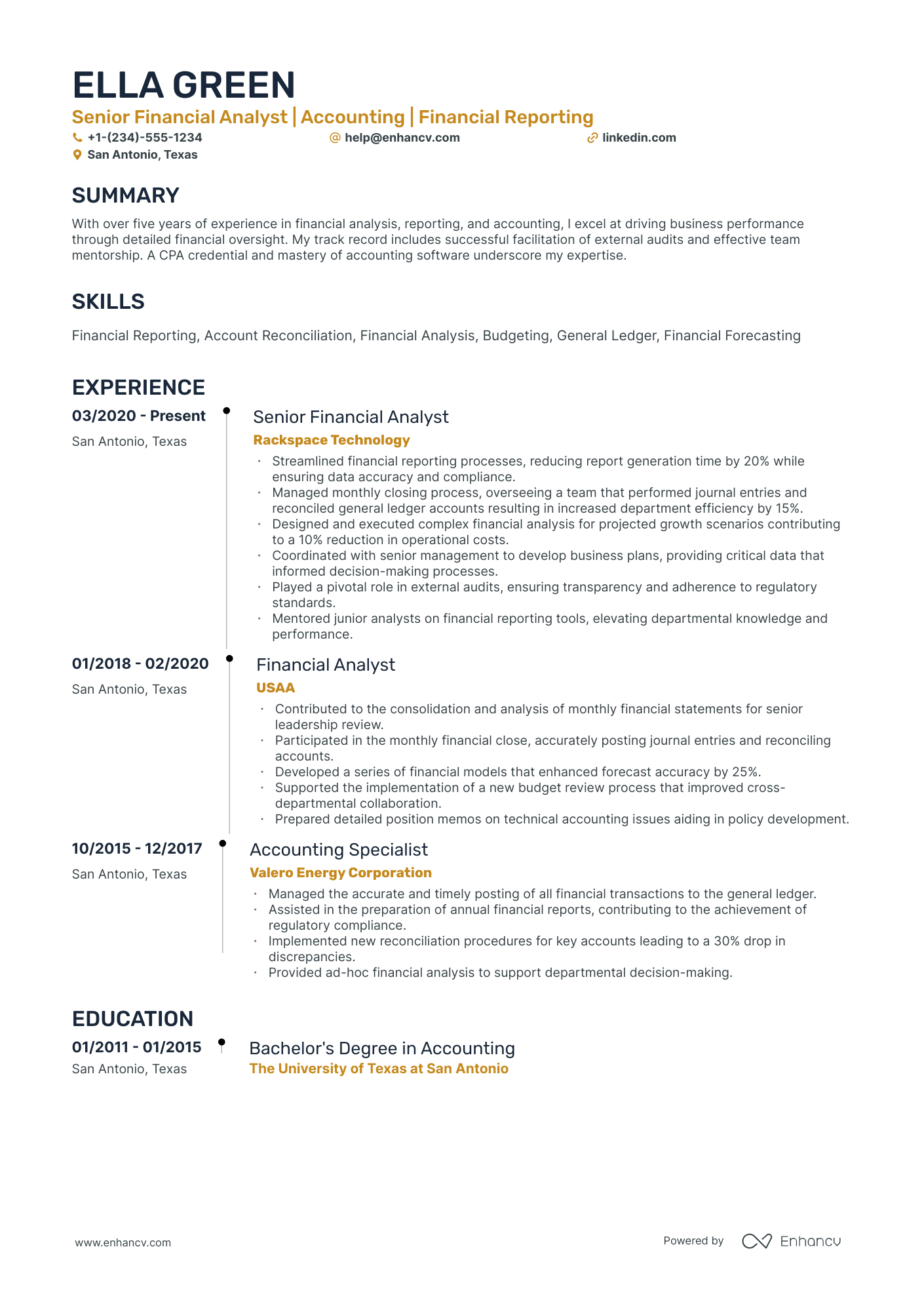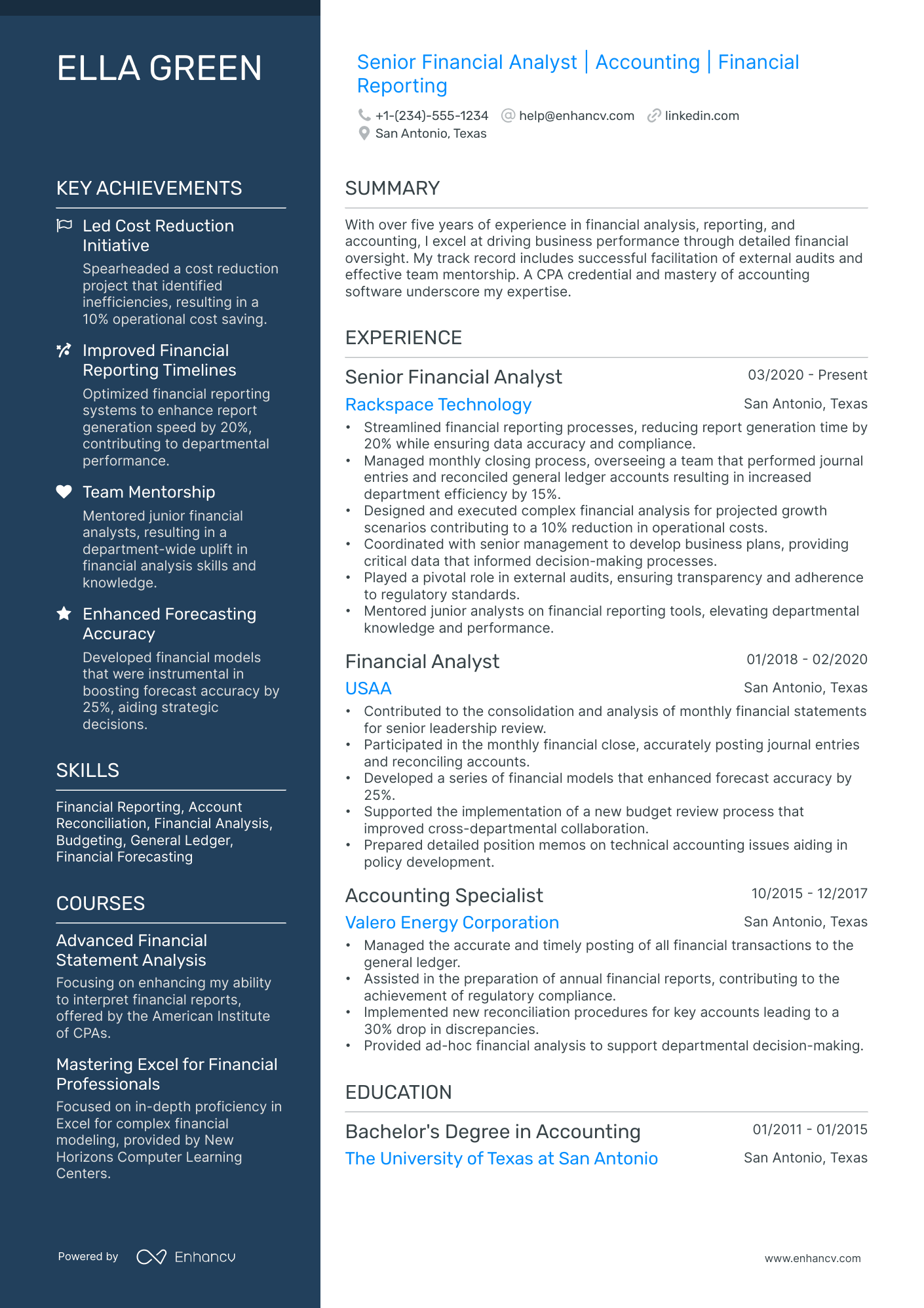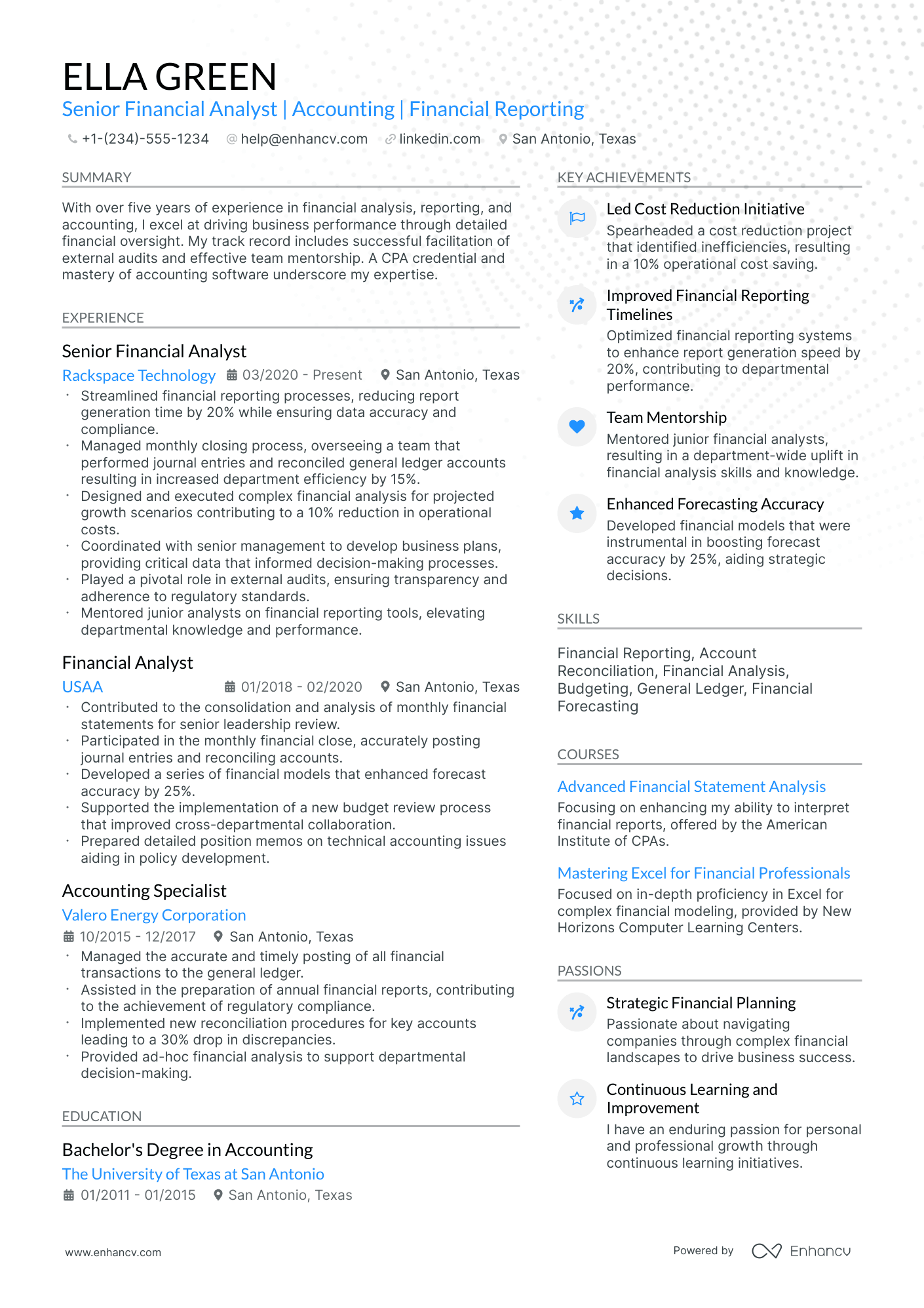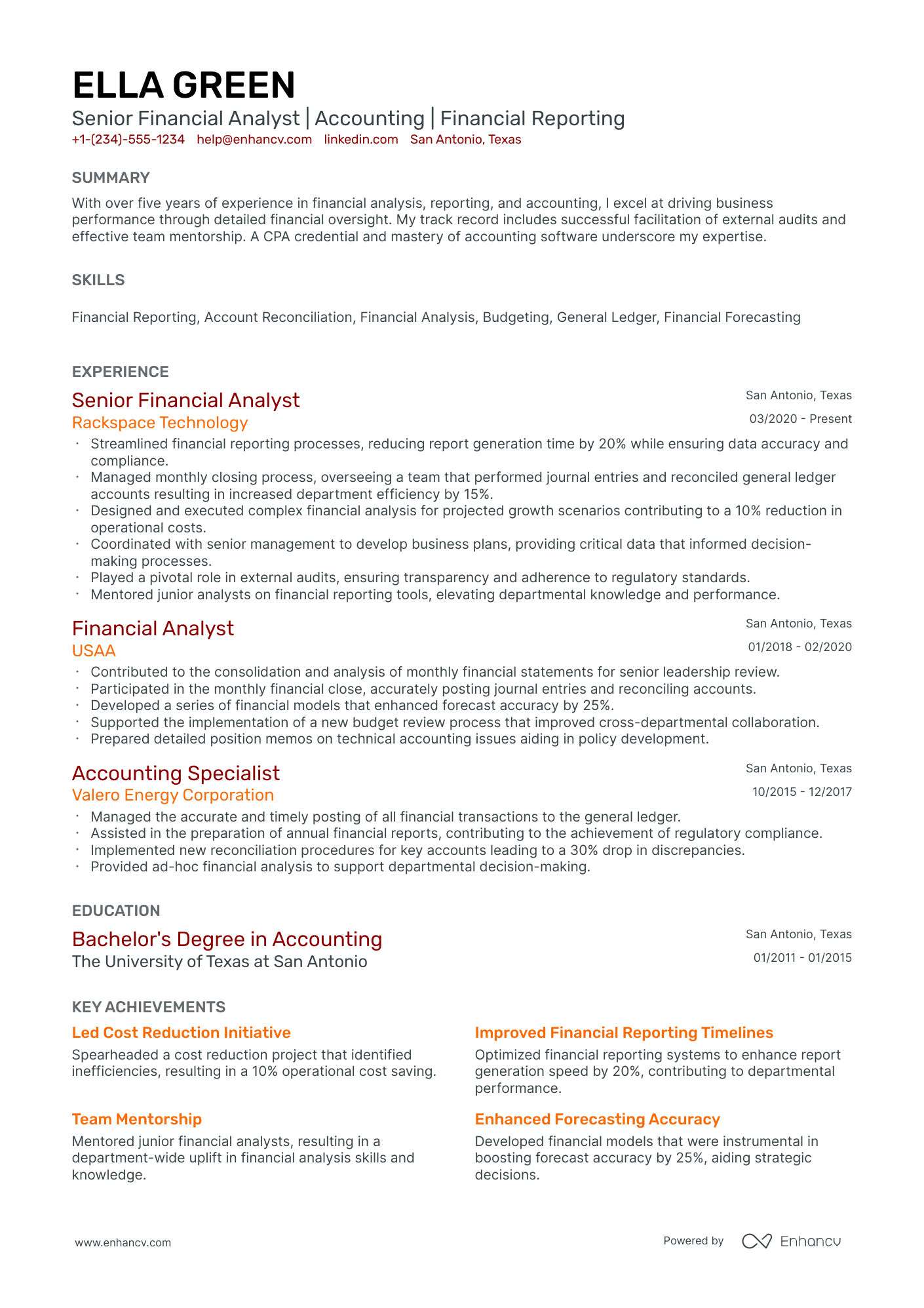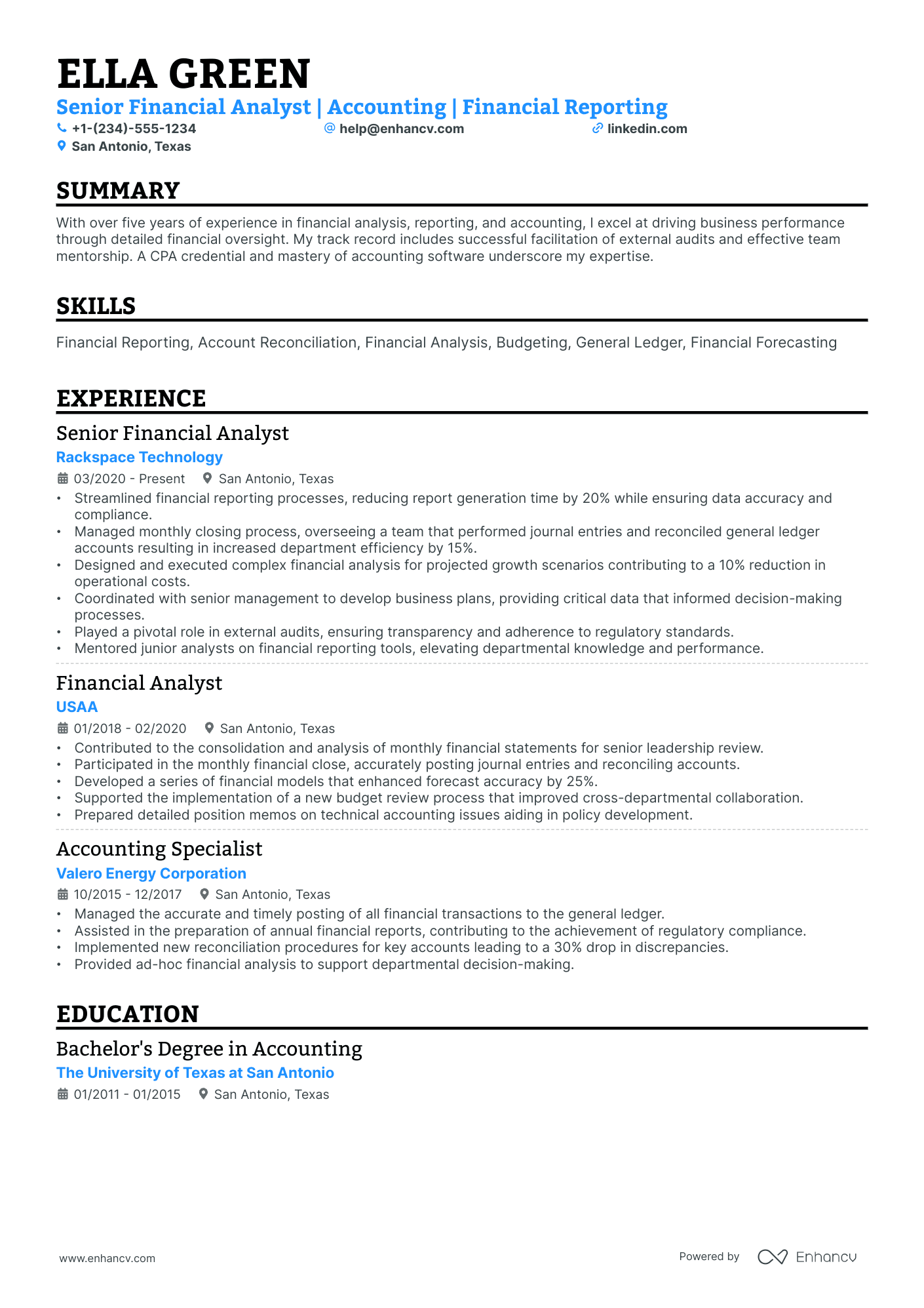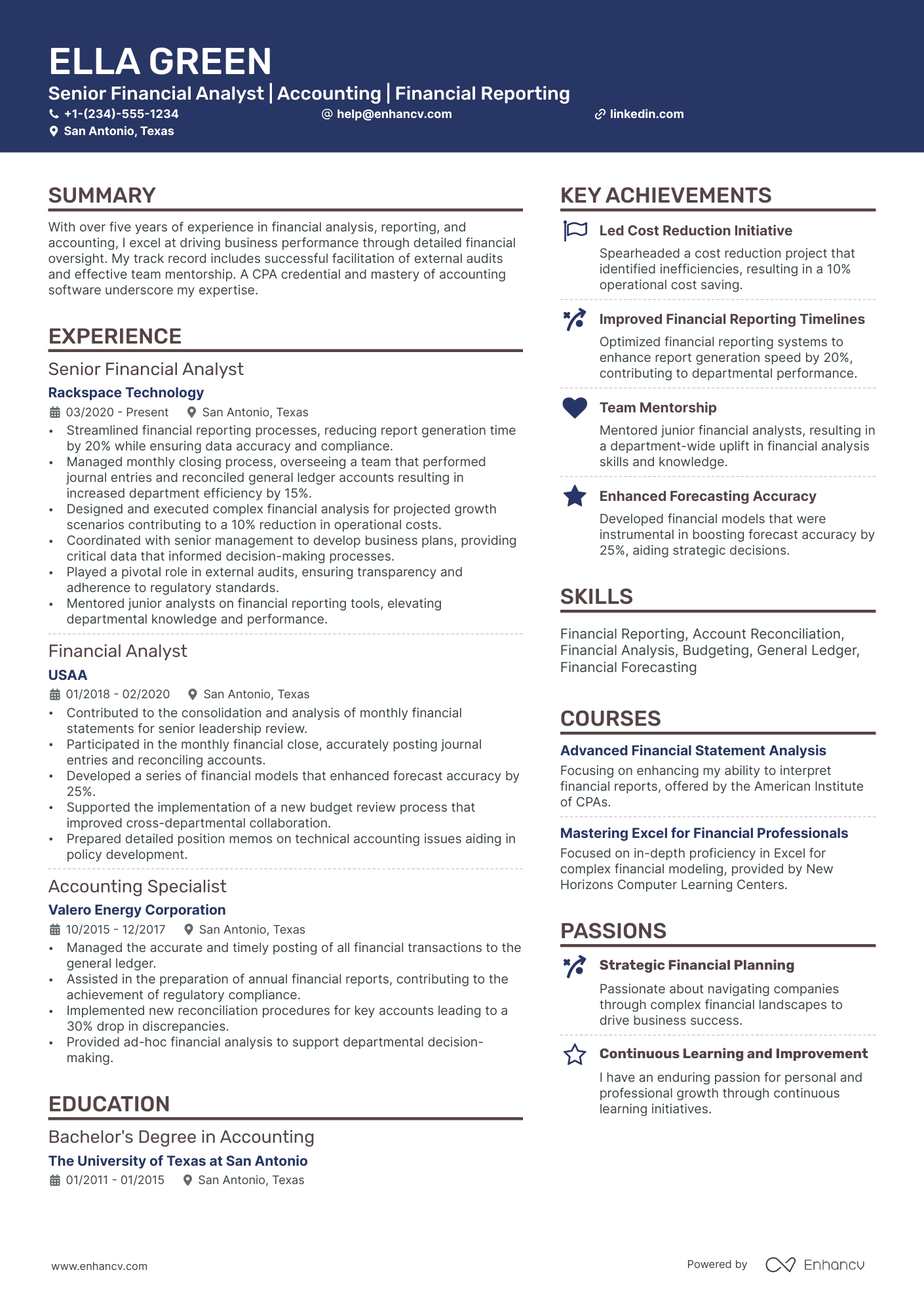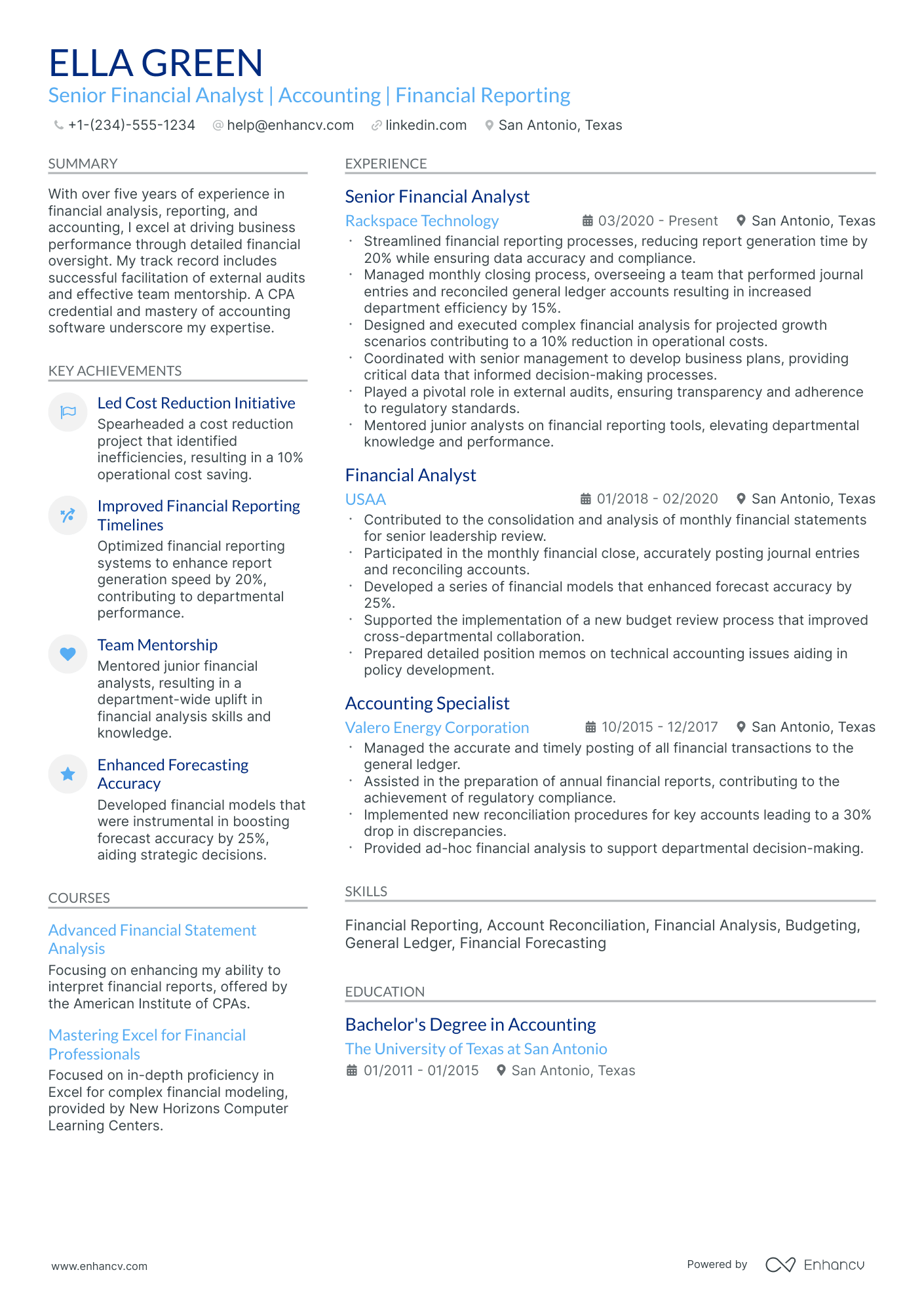Many corporate financial analyst resume drafts fail because they read like task logs, not decision support. In today's ATS screening and rapid recruiter scans, that hides your impact and drops you behind equally qualified candidates.
A strong resume shows how you improved results, not just what you used. Knowing how to make your resume stand out means highlighting variance reductions, forecast accuracy gains, budget scope managed, cycle time cut, margin lift, and faster leadership decisions. Quantify model adoption, audit-ready reporting, and risk reduction.
Key takeaways
- Quantify forecast accuracy, cost savings, and cycle time reductions in every experience bullet.
- Use reverse-chronological format for experienced analysts and hybrid format for career changers.
- Tailor resume language to mirror the exact tools, metrics, and processes in each job posting.
- Anchor every listed skill to a specific project, outcome, or measurable business result.
- Place certifications like the CFA or FMVA near education to reinforce specialized credibility.
- Write a three- to four-line summary that names your domain, tools, and a top achievement.
- Use Enhancv to structure your resume so recruiters and applicant tracking systems surface your impact fast.
How to format a corporate financial analyst resume
Recruiters evaluating corporate financial analyst candidates prioritize financial modeling proficiency, budgeting and forecasting accuracy, and the ability to translate data into actionable business recommendations. A clean, well-structured resume format ensures these signals surface quickly during both automated screening and the 6–10 seconds a hiring manager typically spends on an initial scan.
I have significant experience in this role—which format should I use?
Use a reverse-chronological format to lead with your most recent and relevant financial analysis experience. Do:
- Highlight the scope and ownership of your work—specify which business units, revenue streams, or portfolios you supported and the size of budgets you managed.
- Feature role-specific tools and domains prominently, including Excel (advanced modeling), SQL, ERP systems (SAP, Oracle), BI platforms (Tableau, Power BI), and areas like FP&A, variance analysis, or capital allocation.
- Quantify outcomes tied to business impact, such as cost savings identified, forecast accuracy improvements, or revenue influence from your recommendations.
- Built and maintained a rolling 12-month cash flow forecast for a $200M business unit, reducing quarterly variance by 18% and enabling leadership to reallocate $4.5M toward high-margin product lines.
I'm junior or switching into this role—what format works best?
Use a hybrid format that leads with a targeted skills section, followed by your experience or relevant project work in reverse-chronological order. Do:
- Place core financial analysis skills—financial modeling, data visualization, variance analysis, Excel proficiency—at the top of the resume so recruiters and applicant tracking systems identify your fit immediately.
- Include internships, academic projects, case competitions, or freelance consulting work that demonstrates hands-on financial analysis, even outside a traditional corporate setting.
- Connect every action to a clear outcome so hiring managers see your analytical thinking in practice, not just a list of coursework or tools.
- Financial modeling (skill) → Developed a three-year DCF model for a capstone project evaluating a mid-cap acquisition target (action) → Presented findings that identified a 12% overvaluation, earning top marks and faculty recognition (result).
Why not use a functional resume?
A functional format strips away the timeline and context that hiring managers rely on to evaluate how you've applied financial analysis skills in real work settings, making it harder to assess your readiness for the role.
- A functional format may be acceptable if you're making a career change from a quantitative field (accounting, data science, economics) or returning to work after a gap—but only if every listed skill is anchored to a specific project, analysis, or measurable outcome rather than presented as a standalone competency.
What sections should go on a corporate financial analyst resume
Recruiters expect to quickly find your financial analysis experience, core modeling skills, and measurable business impact. Understanding the essential resume sections helps you organize this information effectively.
Use this structure for maximum clarity:
- Header
- Summary
- Experience
- Skills
- Projects
- Education
- Certifications
- Optional sections: Awards, Leadership, Languages
Your experience bullets should emphasize quantifiable results, business outcomes, scope of ownership, and decision-making impact across forecasting, budgeting, variance analysis, and executive reporting.
Is your resume good enough?
Drop your resume here or choose a file. PDF & DOCX only. Max 2MB file size.
Once you’ve organized your resume with the right components, focus on writing your corporate financial analyst experience section to show how you delivered results in those roles.
How to write your corporate financial analyst resume experience
Your experience section is where you prove you've delivered meaningful financial work—not just participated in it. Hiring managers reviewing corporate financial analyst resumes prioritize demonstrated impact through role-relevant tools, analytical methods, and measurable outcomes over descriptive task lists.
Each entry should include:
- Job title
- Company and location (or remote)
- Dates of employment (month and year)
Three to five concise bullet points showing what you owned, how you executed, and what outcomes you delivered:
- Ownership scope: the financial models, forecasting processes, budgets, reporting systems, or business units you were directly accountable for as a corporate financial analyst.
- Execution approach: the tools, frameworks, and methods you used to drive decisions—such as financial modeling techniques, enterprise resource planning platforms, data visualization software, or variance analysis methodologies.
- Value improved: the specific dimensions of performance you strengthened, whether that meant tighter forecast accuracy, reduced reporting cycle times, improved cost efficiency, better risk visibility, or more reliable cash flow projections.
- Collaboration context: how you partnered with cross-functional stakeholders—treasury, accounting, operations, executive leadership, or external auditors—to align financial analysis with broader corporate strategy.
- Impact delivered: the business outcomes your work produced, framed through results and scale rather than activity, such as decisions influenced, capital allocated more effectively, or financial risks mitigated across the organization.
Experience bullet formula
A corporate financial analyst experience example
✅ Right example - modern, quantified, specific.
Corporate Financial Analyst
NorthBridge Medical Devices | Minneapolis, MN
2022–Present
Mid-market medical device manufacturer with $650M annual revenue and multi-site operations across North America.
- Led monthly close and variance analysis in Oracle NetSuite and Excel Power Query, cutting forecast-to-actual review time by 30% and improving budget owner response rates by 20%.
- Built a driver-based forecasting model in Anaplan for revenue, gross margin, and operating expenses across six business units, improving forecast accuracy from 92% to 97% and reducing rework by 25%.
- Partnered with sales operations and product managers to redesign pricing waterfall and discount governance in Salesforce and Tableau, lifting average realized price by 1.8% and adding $4.2M in annual gross profit.
- Automated capital expenditure tracking and return on investment reporting using Power BI and SQL extracts, reducing reporting cycle time from five days to two days and improving on-time approvals by 15%.
- Presented quarterly performance and cash flow insights to the chief financial officer and department heads, aligning cost actions to targets and delivering $3.1M in run-rate savings through vendor consolidation and spend controls.
Now that you've seen how a strong experience section comes together, let's look at how to adjust yours to match a specific job posting.
How to tailor your corporate financial analyst resume experience
Recruiters evaluate your corporate financial analyst resume through both applicant tracking systems and manual review. Tailoring your resume to the job description ensures your qualifications register with both.
Ways to tailor your corporate financial analyst experience:
- Match financial modeling tools and ERP systems named in the posting.
- Mirror the exact terminology used for forecasting and budgeting processes.
- Reflect specific KPIs or financial performance metrics the role tracks.
- Highlight variance analysis or reporting frameworks referenced in the description.
- Emphasize regulatory compliance and audit standards when listed as requirements.
- Include relevant industry experience such as banking or manufacturing sectors.
- Align your work with cross-functional collaboration models the posting describes.
- Reference valuation methodologies or capital planning approaches the role requires.
Tailoring means aligning your real accomplishments with stated job requirements, not forcing disconnected keywords into your experience bullets.
Resume tailoring examples for corporate financial analyst
| Job description excerpt | Untailored | Tailored |
|---|---|---|
| Build and maintain three-statement financial models to support quarterly forecasting and annual budgeting across business units | Assisted with financial planning and helped prepare reports for management review. | Built and maintained three-statement financial models in Excel to support quarterly forecasting and annual budgeting across four business units, improving forecast accuracy by 12%. |
| Perform variance analysis on P&L results and present findings to senior leadership using Power BI dashboards | Analyzed financial data and created presentations for stakeholders. | Conducted monthly P&L variance analysis identifying $2.3M in cost overruns and presented root-cause findings to senior leadership through automated Power BI dashboards. |
| Partner with FP&A and treasury teams to evaluate capital allocation decisions and support M&A due diligence | Worked cross-functionally on various finance projects and initiatives. | Partnered with FP&A and treasury to evaluate capital allocation scenarios for three acquisition targets, building DCF and comparable company models that informed $85M in M&A due diligence decisions. |
Once your experience aligns with the role’s priorities, the next step is to quantify your corporate financial analyst achievements so hiring managers can see the impact behind those responsibilities.
How to quantify your corporate financial analyst achievements
Quantifying your achievements proves business impact beyond tasks. Focus on cycle time, forecast accuracy, cost savings, risk reduction, and reporting reliability—numbers that show better decisions, faster closes, and tighter control.
Quantifying examples for corporate financial analyst
| Metric | Example |
|---|---|
| Forecast accuracy | "Improved quarterly revenue forecast accuracy from 92% to 97% by rebuilding the driver-based model in Excel and Power BI for a $250M business unit." |
| Close cycle time | "Cut monthly close reporting cycle from five days to three by automating variance bridges and consolidations with Power Query and standardized templates." |
| Cost savings | "Identified $1.2M annual savings by analyzing vendor spend and renegotiation scenarios, then tracking realized savings in a rolling budget forecast." |
| Risk reduction | "Reduced budget overrun risk by 30% by introducing scenario analysis and weekly burn-rate alerts for ten cost centers totaling $40M in annual spend." |
| Reporting reliability | "Lowered reporting errors from eight to one per month by adding reconciliation checks and version control across 25 recurring management reports." |
Turn your everyday tasks into measurable, recruiter-ready resume bullets in seconds with Enhancv's Bullet Point Generator.
Once you've crafted strong bullet points for your experience section, you'll want to apply that same precision to presenting your hard and soft skills effectively.
How to list your hard and soft skills on a corporate financial analyst resume
Your skills section shows you can model performance, forecast outcomes, and influence decisions, and recruiters and an ATS (applicant tracking system) scan them to confirm fit fast—aim for a heavier mix of hard skills with targeted, role-specific soft skills. corporate financial analyst roles require a blend of:
- Product strategy and discovery skills.
- Data, analytics, and experimentation skills.
- Delivery, execution, and go-to-market discipline.
- Soft skills.
Your skills section should be:
- Scannable (bullet-style grouping).
- Relevant to the job post.
- Backed by proof in experience bullets.
- Updated with current tools.
Place your skills section:
- Above experience if you're junior or switching careers.
- Below experience if you're mid/senior with strong achievements.
Hard skills
- Financial modeling (three-statement)
- Budgeting and forecasting
- Variance analysis
- Management reporting
- Profit and loss analysis
- Cash flow forecasting
- Scenario and sensitivity analysis
- Microsoft Excel, Power Query, PivotTables
- SQL reporting queries
- Power BI dashboards
- NetSuite, SAP, Oracle
- GAAP and SEC reporting support
Soft skills
- Translate analysis into decisions
- Present to finance leadership
- Partner with business owners
- Challenge assumptions with data
- Align stakeholders on trade-offs
- Drive deadlines and close cadence
- Write clear executive summaries
- Ask targeted clarifying questions
- Prioritize highest-impact analyses
- Own deliverables end-to-end
- Communicate risks early
- Influence without authority
How to show your corporate financial analyst skills in context
Skills shouldn't live only in a dedicated skills list. Explore curated resume skills examples to see how top candidates present their competencies effectively.
They should be demonstrated in:
- Your summary (high-level professional identity)
- Your experience (proof through outcomes)
Here's what strong, skill-rich entries look like in practice.
Summary example
Senior corporate financial analyst with eight years in healthcare finance. Skilled in SAP, advanced DCF modeling, and cross-functional forecasting. Reduced budget variance by 14% through improved rolling forecast accuracy and executive-level scenario analysis.
- Reflects senior-level expertise clearly
- Names industry-relevant tools and methods
- Leads with a measurable outcome
- Signals communication and collaboration strengths
Experience example
Senior Corporate Financial Analyst
Meridian Health Partners | Chicago, IL
June 2019–Present
- Built a dynamic three-statement model in Excel and SAP that cut monthly close time by 22%, collaborating with accounting leadership.
- Led cross-departmental variance analysis using Power BI dashboards, reducing quarterly forecast deviation from 9% to 4%.
- Partnered with the FP&A director to redesign capital allocation frameworks, freeing $3.2M for strategic reinvestment.
- Every bullet contains measurable proof
- Skills surface naturally through real outcomes
Once you’ve demonstrated your financial analyst capabilities through concrete examples and outcomes, the next step is to apply that same approach to building a corporate financial analyst resume when you don’t have direct experience.
How do I write a corporate financial analyst resume with no experience
Even without full-time experience, you can demonstrate readiness through:
- Finance case competitions and pitches
- University budgeting or finance committees
- Financial modeling course capstone project
- Internship-style consulting for nonprofits
- Equity research reports and valuations
- Personal portfolio tracking and analysis
- Accounting or finance tutoring assistant
If you're building a resume without work experience, focus on:
- Three-statement models with assumptions
- Forecasting, variance, and KPI tracking
- Excel, SQL, and Power BI
- Clean, audited, documented work samples
Resume format tip for entry-level corporate financial analyst
Use a reverse-chronological resume format because it highlights recent projects, internships, and coursework that prove corporate financial analyst readiness. Do:
- Put projects above experience.
- Quantify outcomes with dollars and percentages.
- List tools: Excel, SQL, Power BI.
- Add links to models and dashboards.
- Match keywords to the job posting.
- Built a three-statement model in Excel with scenario analysis for a capstone company, improving forecast accuracy by 12% versus baseline assumptions.
How to list your education on a corporate financial analyst resume
Your education section helps hiring teams confirm you have the foundational knowledge needed. It validates your analytical training and financial expertise for the corporate financial analyst role.
Include:
- Degree name
- Institution
- Location
- Graduation year
- Relevant coursework (for juniors or entry-level candidates)
- Honors & GPA (if 3.5 or higher)
Skip month and day details—list the graduation year only.
Here's a strong education entry for a corporate financial analyst resume.
Example education entry
Bachelor of Science in Finance
University of Michigan, Ann Arbor, MI
Graduated 2021
GPA: 3.7/4.0
- Relevant Coursework: Corporate Finance, Financial Modeling, Econometrics, Advanced Accounting, Capital Markets
- Honors: Magna Cum Laude, Dean's List (six consecutive semesters)
How to list your certifications on a corporate financial analyst resume
Certifications on a resume show a corporate financial analyst's commitment to learning, proficiency with core tools, and alignment with industry standards, especially when your experience does not cover every requirement.
Include:
- Certificate name
- Issuing organization
- Year
- Optional: credential ID or URL
- Place certifications below education when they are older, less relevant, or you already have strong corporate financial analyst experience.
- Place certifications above education when they are recent, highly relevant, or required for the corporate financial analyst role you target.
Best certifications for your corporate financial analyst resume
- Chartered Financial Analyst (CFA)
- Certified Public Accountant (CPA)
- Certified Management Accountant (CMA)
- Financial Modeling and Valuation Analyst (FMVA)
- Chartered Global Management Accountant (CGMA)
- Bloomberg Market Concepts (BMC)
- Certified Treasury Professional (CTP)
Once you’ve positioned your credentials where recruiters can find them quickly, shift to your corporate financial analyst resume summary to connect those qualifications to the value you’ll deliver.
How to write your corporate financial analyst resume summary
Your resume summary is the first thing a recruiter reads. A strong one instantly signals you're qualified for a corporate financial analyst role.
Keep it to three to four lines, with:
- Your title and relevant years of experience in financial analysis.
- Domain focus such as corporate FP&A, treasury, or capital markets.
- Core tools like Excel, SQL, Hyperion, or Tableau.
- One or two quantified achievements that show measurable impact.
- Soft skills tied to real outcomes, such as cross-functional collaboration or stakeholder communication.
PRO TIP
At this level, emphasize technical skills, relevant coursework, and early wins that prove you can deliver. Highlight specific tools and methodologies you've applied in real projects. Avoid vague phrases like "passionate self-starter" or "fast learner." Replace them with concrete contributions and measurable results.
Example summary for a corporate financial analyst
Corporate financial analyst with two years of experience in FP&A and variance reporting. Built automated Excel models that cut monthly close time by 20%. Skilled in SQL, Hyperion, and cross-departmental budget collaboration.
Optimize your resume summary and objective for ATS
Drop your resume here or choose a file.
PDF & DOCX only. Max 2MB file size.
Now that you've crafted a summary that highlights your financial expertise and value, ensure the header above it presents your professional contact details correctly so recruiters can easily reach you.
What to include in a corporate financial analyst resume header
A resume header lists your key contact and professional links, and it boosts visibility, credibility, and recruiter screening for a corporate financial analyst.
Essential resume header elements
- Full name
- Tailored job title and headline
- Location
- Phone number
- Professional email
- GitHub link
- Portfolio link
A LinkedIn link helps recruiters verify experience quickly and supports screening.
Don't include a photo on a corporate financial analyst resume unless the role is explicitly front-facing or appearance-dependent.
Keep your header on one to two lines, match your job title to the posting, and use links that open to complete, updated profiles.
Example
Corporate financial analyst resume header
Jordan Lee
Corporate Financial Analyst | FP&A, Budgeting, Forecasting
Chicago, IL
(312) 555-12XX
jordan.lee@enhancv.com
github.com/jordanlee
yourwebsite.com
linkedin.com/in/jordanlee
Once your contact details and role identifiers are set, add targeted additional sections to reinforce your fit and round out the resume.
Additional sections for corporate financial analyst resumes
When your core qualifications match other applicants, well-chosen additional sections can set your corporate financial analyst resume apart. For example, listing language skills on your resume can be a differentiator in multinational finance environments.
- Languages
- Certifications (CFA, CPA, FMVA)
- Industry conferences and presentations
- Publications and financial research
- Professional affiliations
- Volunteer financial consulting
- Technical proficiencies (ERP systems, BI tools)
Once you've rounded out your resume with the right supplementary sections, it's worth pairing it with a cover letter to strengthen your overall application.
Do corporate financial analyst resumes need a cover letter
A cover letter isn't required for a corporate financial analyst role, but it often helps. If you're wondering what a cover letter is and when it matters most, it's typically in competitive postings or when hiring managers expect context beyond the resume. It can make the difference when your fit isn't obvious.
Use a cover letter to add value in these situations:
- Explain role and team fit by linking your planning, budgeting, or forecasting strengths to the corporate financial analyst job's priorities.
- Highlight one or two outcomes, such as improving forecast accuracy, shortening close timelines, or building a model leaders used for decisions.
- Show you understand the product, users, and business context by naming key drivers, revenue streams, costs, and the stakeholders you'd support.
- Address career transitions or non-obvious experience by mapping your prior work to corporate financial analyst responsibilities and tools.
Drop your resume here or choose a file.
PDF & DOCX only. Max 2MB file size.
Once you’ve decided how to handle a cover letter for your application, you can use AI to improve your corporate financial analyst resume by sharpening your content and aligning it with the role.
Using AI to improve your corporate financial analyst resume
AI can sharpen your resume's clarity, structure, and impact. It helps tighten language and highlight measurable results. But overuse kills authenticity. Once your content is clear and role-aligned, step away from the tool. For specific guidance, explore these ChatGPT resume writing prompts to get started.
Here are 10 practical prompts to strengthen specific sections of your corporate financial analyst resume:
Strengthen your summary
Quantify experience bullets
Tighten action verbs
Align skills section
Refine project descriptions
Improve education details
Clarify certification relevance
Remove filler language
Tailor for ATS
Sharpen bullet structure
Conclusion
A strong corporate financial analyst resume shows measurable outcomes, role-specific skills, and a clear structure. It highlights impact in forecasting, budgeting, variance analysis, reporting, and modeling, backed by numbers. It stays easy to scan, consistent, and focused on the role.
Hiring teams want corporate financial analyst candidates who can improve decisions and communicate results. A resume that proves performance, shows strong technical and business skills, and reads cleanly signals readiness for today’s market and what comes next.
